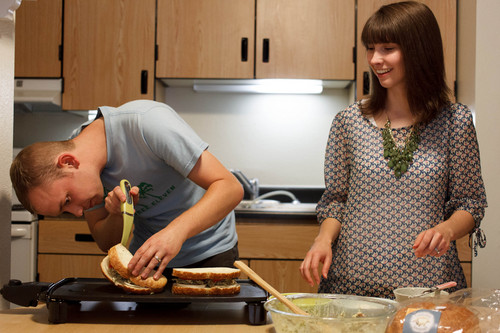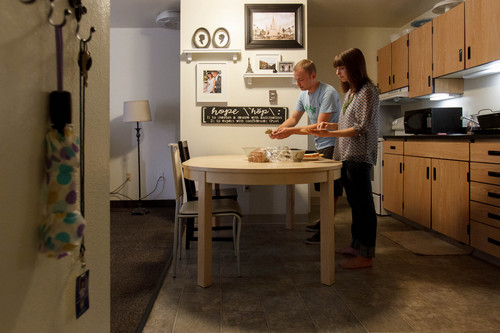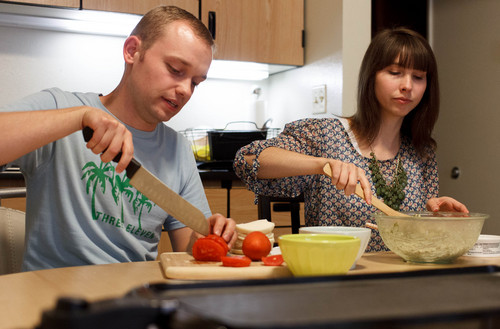This is an archived article that was published on sltrib.com in 2013, and information in the article may be outdated. It is provided only for personal research purposes and may not be reprinted.
In just a few months, Jonathan Hope will have a birthday and a big decision to make. On Dec. 28, the Brigham Young University student will turn 26 and be dropped from his parents' health plan, leaving him uninsured for the first time.
Two days later, the Affordable Care Act (ACA) will take full effect, forcing the dietetics major to decide what to do about getting insurance. Passed in 2010, the ACA requires nearly every American to have health insurance or pay a tax penalty.
Although Hope said he rarely uses his current coverage, he already knows he doesn't want to be without a safety net. His wife of three years, Courtney, is already uninsured and the couple are thinking about starting a family.
"The thought of not having insurance scares me," Jonathan Hope said. "I just can't imagine going without."
But like many young adults, the Hopes say they are not quite sure how to pick the right plan or what they'll be able to afford on their meager, part-time salaries.
"I honestly do not claim to know anything about the Affordable Care Act," said Courtney Hope, who works as a special-education teacher's aide in the Provo School District. "It definitely worries me that I am uninsured. If I needed surgery or had a serious illness, we would be in a lot of trouble. We would probably end up going into major debt because we do not have the money to pay for health care."
The Hopes are among the more than 17 million uninsured young adults ages 18 to 34 across the U.S. — about 140,800 of them in Utah — weighing the requirements of the law against the financial and practical realities of their lives.
—
Young invincibles • Experts say getting young Americans insured is critical to the success of the ACA. Those who are young and healthy reduce the risk in the insurance pool and balance the costs for older, less-healthy people. Many speculate, however, that the so-called "young invincibles" won't rush to buy insurance when the online marketplaces launch Oct. 1 because they don't think they need it.
It turns out, the opposite is true, said Christina Postolowski, a policy analyst for the advocacy group Young Invincibles, which is working to educate young adults about the law and get them enrolled in plans in all 50 states.
"What a lot of our polling found is that only about 5 percent of people don't have it because they think they don't need it," Postolowski said. "A much larger percentage don't have it because they can't afford it."
An August report from the Commonwealth Fund's Health Insurance Tracking Survey also found that a majority of 19 to 29-year-olds will get insurance if it's available and within their financial reach.
The survey tracked uninsured rates in the wake of the ACA's passage in 2010, which allowed young adults to stay on a parent's plan through age 25. It found that young adults increasingly took advantage of the benefit.
Massachusetts, where earlier reforms forced an insurance mandate, offers similar proof that young adults want to be insured, said Amanda Starc, an assistant professor of health care management at the Wharton School of Business.
An economist, Starc studies the use of that state's online marketplace and found individuals age 27 and older have shown a "somewhat annoyingly high" rate of compliance with the law. "It's 99-plus percent," Starc said.
—
Do it for Mom • In Utah, about 26,000 young adults have remained enrolled on parents' plans under the ACA. Reaching the rest will be a key focus of the Utah Health Policy Project, one of a handful of state nonprofits awarded federal navigator grants to assist the public with enrollment.
The Commonwealth study found about 70 percent of young adults know little or nothing about the law, UHPP spokesman Jason Stevenson said. The agency plans seminars on Utah college campuses in coming months.
"The goal (of the message) is to find some quintessential Utah snowboarder, or canyoneer, skateboarder or young family and say, 'This is how the ACA marketplace can help you,' " Stevenson said. "This could be your Mother's Day gift to your mom: Get health insurance, it's going to lower her blood pressure."
Many young adults Stevenson has spoken to have said they may wait to buy insurance and instead pay the tax penalty in 2015. Penalties will be low in the first year — about $95 — but go up rapidly in subsequent years.
In the long run, buying insurance will be both smarter and cheaper than a hefty hospital bill, he notes.
"I always tell them to remember that you can't buy Obamacare in the ambulance on the way to the hospital."
—
Calculating the cost • Because young adults are often still in school, working unpaid internships or underemployed in part-time jobs without benefits, plan costs and subsidies will figure into their insurance decisions, Postolowski said.
To be eligible for a subsidy, consumers must have household incomes between 100 percent and 400 percent of the federal poverty level and must purchase at least a midlevel "silver" plan, which splits the cost of medical care with enrollees at a 70-30 rate.
Utah is among the states that has not released its plan rates. Advocates say the costs nationwide appear to be lower than many had predicted, particularly for young adults.
"We've been encouraged by the rates that have been coming out," Postolowski said. "And a lot of them don't account for the subsidies for which young people will qualify."
In Utah, UHPP estimates large numbers of young adults — as many as 25,000 in Utah County and 35,000 in Salt Lake County — may qualify, Stevenson said.
Preliminary data from the state Department of Insurance show a Salt Lake County 27-year-old will pay between $162 and $255 a month before the subsidies. In Cache County, monthly costs range from $203 to $269; in Utah County, $209 to $263; in Washington County, $219 to $269; and, in Weber County, $189 to $263.
—
The Medicaid gap • For young Utahns whose incomes hover at the poverty line or below, the biggest challenge will come if state leaders don't expand Medicaid.
Under the ACA, states can opt to widen the eligibility rules for the public insurance plan. In states that don't expand, most working-age adults with incomes under 100 percent of the federal poverty level won't have access to Medicaid and won't qualify for subsidies.
Gov. Gary Herbert has said he won't announce his plans for Medicaid until early 2014.
Should Utah decide to expand Medicaid, an estimated 71,000 uninsured young adults ages 18 to 34 would be eligible, the Young Invincibles data predict.
Those earning above 100 percent of poverty— about 84,000 Utahns in the same age group — could be eligible for subsidies to help them buy private plans through the online insurance marketplace, according to Young Invincibles.
Jonathan Hope isn't sure how much he and his wife will earn this year. He works on BYU's campus and is limited to 20 hours each week. Courtney Hope had been working 35 hours a week. But to skirt the upcoming ACA requirement to provide insurance to employees who work more than 30 hours a week, her school district cut the hours of part-time workers, her husband said.
The couple plan to seek out the help of an ACA navigator after Oct. 1.
"I have mixed feelings about the law and being 'forced' into doing it. That always leaves a bad taste in people's mouths," Jonathan Hope said. "Health insurance shouldn't be a luxury, in my opinion, but I also believe in personal responsibility. If [the cost] for us were about $150 a month or even a little bit more for us to have it, that's an investment I'm willing to make." —
Save the date
On Oct. 9 at 7 p.m., The Salt Lake Tribune and KCPW will co-sponsor a town hall meeting on the Affordable Care Act at the Salt Lake City Main Library auditorium, 210 E. 400 South, Salt Lake City. Jennifer Napier-Pearce will moderate a discussion with a panel of experts, who also will address questions. —
What do you want to know about the Affordable Care Act?
Help shape our coverage by sending an email to healthreform@sltrib.com. —
Learn more about the law
Understanding Utah's health care exchange Trib Talk: Young Adults and Health Reform
About 30 percent of American young adults don't have health insurance, a fact that needs to change for Obamacare to work. On Tuesday at 11:30 a.m., Trib Talk guests will discuss the role young people will play in health reform and how to persuade them to sign up for a health plan. To participate, send questions to the hashtag #TribTalk on Twitter or Google+.









